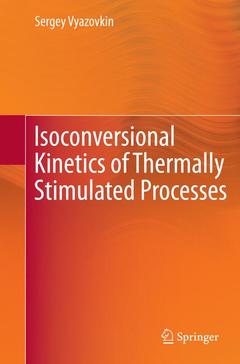Description
Isoconversional Kinetics of Thermally Stimulated Processes, Softcover reprint of the original 1st ed. 2015
Author: Vyazovkin Sergey
Language: English
Subjects for Isoconversional Kinetics of Thermally Stimulated Processes:
Approximative price 94.94 €
In Print (Delivery period: 15 days).
Add to cartPublication date: 10-2016
Support: Print on demand
Approximative price 137.14 €
In Print (Delivery period: 15 days).
Add to cartPublication date: 03-2015
239 p. · 15.5x23.5 cm · Hardback
Description
/li>Contents
/li>Biography
/li>Comment
/li>
Professor Sergey Vyazovkin received his Ph.D. from the Byelorussian State University in 1989. He then joined the Institute for Physical Chemistry (Minsk) where he worked until 1993. Since 1993 he had held visiting positions at the Technical University of Vienna, the University of Toledo, and the University of Nice Sophia-Antipolis. Before joining the University of Alabama at Birmingham, he worked in the University of Utah as a research faculty and the deputy director of the Center for Thermal Analysis. His research interests are concerned with the application of thermal analysis methods to thermally stimulated processes in a wide variety of condensed phase systems. He is a winner of Mettler-Toledo Award in thermal analysis and of James J. Christensen Award in calorimetry. Prof. Vyazovkin is editor of Thermochimica Acta and a member of the editorial board of Macromolecular Rapid Communications and Macromolecular Chemistry and Physics. He is a member of the American Chemical Society Analytical Division, the North American Thermal Analysis Society, and the International Confederation for Thermal Analysis and Calorimetry.
First book to discuss isoconversional kinetic methods
Introduces audience to thermogravimetry and calorimetry
Author is leading expert and developer of novel applications and methodology
Includes supplementary material: sn.pub/extras




